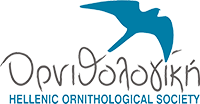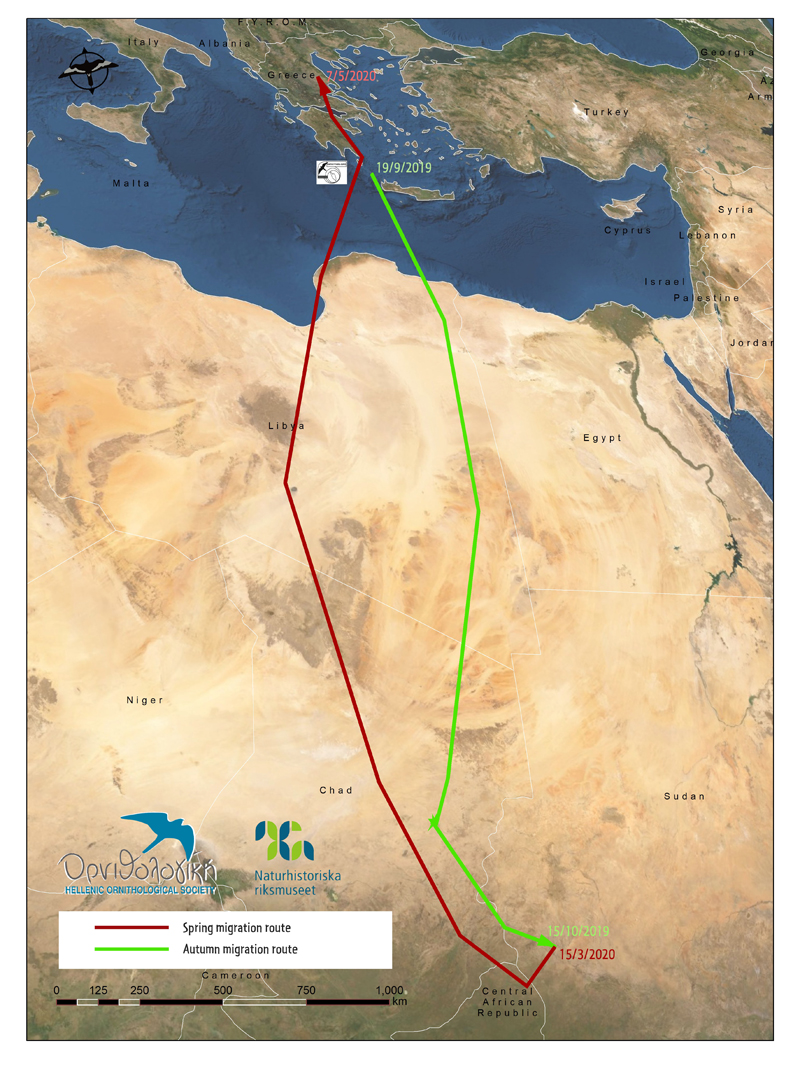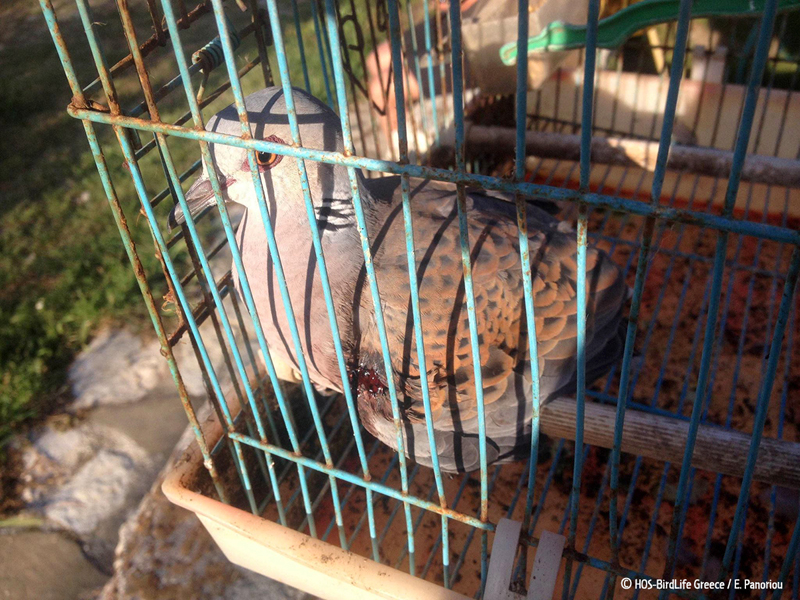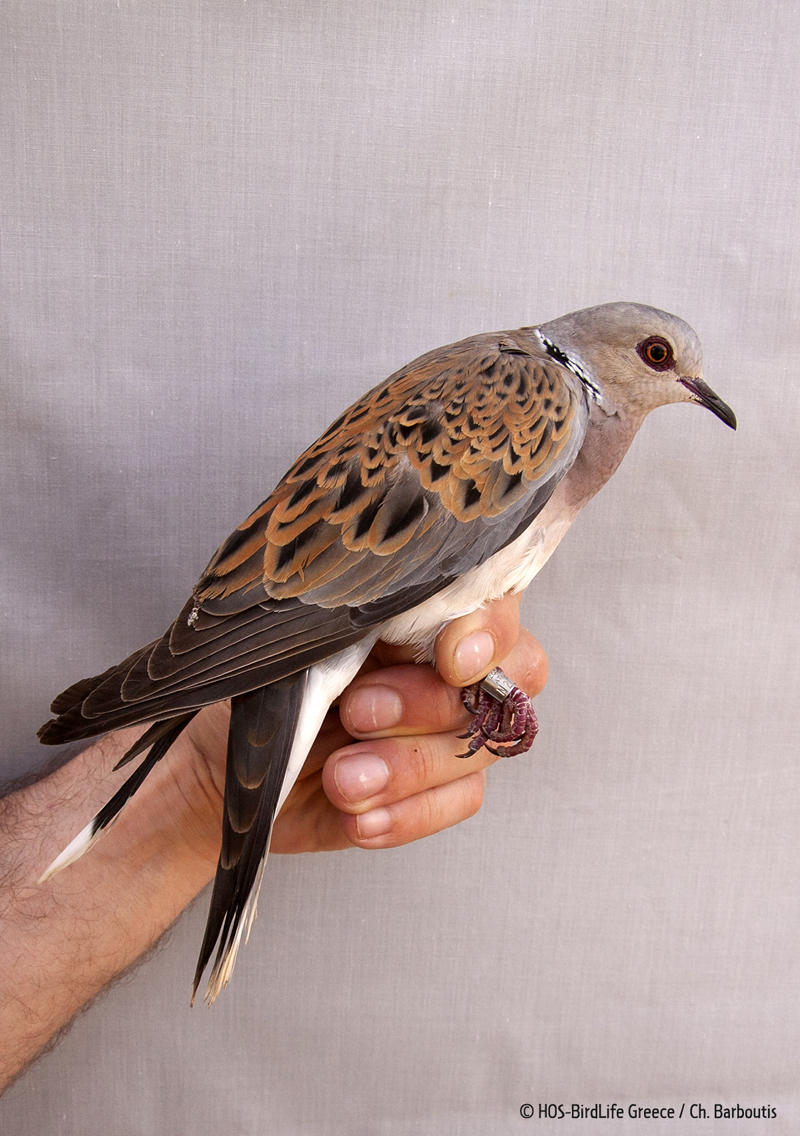“Athena” is a special –and valuable– partner for the Hellenic Ornithological Society/BirdLife Greece; this female Turtle Dove, tagged with a satellite transmitter in Antikythira Bird Observatory last autumn, gives us the rare opportunity to follow her during her long migratory travels.
Monitoring the transmitter’s signal, we watched “Athena” leaving Antikythira in mid-September last year and reaching southwest Sudan in Sub-Saharan Africa after almost a month; a 3,000 km crossing to arrive to her wintering grounds.
As spring came, she spread her wings again for the breeding areas in Europe. It’s a most dangerous journey: she needed to overcome two major obstacles, the Sahara Desert and the Mediterranean Sea.
But “Athena” made it! Crossing Chad and Libya, she left the vast desert behind her and after a resting stopover in coastal Cyrenaica, she set off for the Mediterranean Sea crossing. Flying over Kythira Island, she reached southeastern Peloponnese. After two nights, she arrived, a few days ago, to the Thessalian plain, Central Greece, a popular feeding area for migratory seed-eating birds. Next, “Athena” will head north to reach her breeding area, probably somewhere in the Balkans.
Life is not rosy for the Turtle Doves: A symbol of beauty, love and partnership from ancient times, the Turtle Dove is the only species of the Columbidae family (pigeons and doves) in Europe that undertakes a long-distance migration. In recent years, the species’ populations have declined dramatically, up to 80%, a fact that led to its classification as Vulnerable in IUCN’s Red List. Habitat loss due to extended human activity has played a major role in this, but illegal hunting in the Mediterranean countries is also a crucial factor.
Spring hunting, illegal in Greece already from 1983, constitutes a real crime against Turtle Doves arriving exhausted and emaciated from their long travel; a crime victimizing birds coming to Europe to nest. Illegal spring hunting is especially troublesome in the Ionian Islands, Western Greece, where, despite the decades’ long prohibition, is still considered a “traditional” activity.
Even now, with imposed restrictions due to the coronavirus pandemic, in these islands, sites of passage for the Turtle Doves, there are poachers’ barrels aiming and shooting. Disseminating information on the dangers of illegal spring hunting and demanding for law enforcement are goals set by HOS/BirdLife Greece in order to finally make this atrocious practice a thing of the past.
We want “Athena” to keep transmitting her signal. Is there anyone who wants to see her signal eliminated from our screens?
The importance of telemetry: Satellite transmitters are an important tool in the efforts for the Turtle Dove’s conservation. The light transmitter, weighing a few grams only, transmits signals through stellite, enabling the tracing of the migratory route and the designation of important stopover sites, as well as the wintering and breeding areas.
This volume of important data, gathered in nearly real-time, produces valuable scientific information, helping to form targeted conservation actions for the Turtle Dove, in order to counter the threats for the species.
The satellite telemetry project that enabled HOS/BirdLife Greece to monitor “Athena’s” fascinating journeys is an initiative of The Swedish Museum of Natural History (Naturhistoriska riksmuseet) in cooperation with HOS/BirdLife Greece, funded by Marie-Claire Cronstedts Foundation and supported by SANI S.A.
The project is being implemented in Antikythira Bird Observatory, supported by A. G. Leventis Foundation, where every spring and autumn thousands of birds are monitored mainly through ringing, providing valuable data for the study of the Eastern Mediterranean flyway.
Under this Project, five Turtle Doves have been tagged with satellite transmitters to date. Next autumn, coronavirus administrative restrictions allowing, more transmitters are to be installed/mounted, in order to study the migratory birds’ routes to Africa and back to Greece and Europe during springtime.

The LIFE Project “Awareness and Capacity Building against Bird Crime in Priority Flyway Countries” (LIFE17 GIE/NL/000599) is coordinated by BirdLife Stichting Europe and implemented by Association BIOM (BirdLife Croatia), HOS/BirdLife Greece, BirdLife Cyprus, BirdLife International and LIPU (BirdLife Italy), during September 2018 – 28 February 2022. The project is implemented with the financial support of the LIFE fund of the EU and co-funded by the MAVA Foundation. https://flightforsurvival.org/
Contact:
Roula Trigou, Head of Communications | +30 210 8227937 Int. 118 | This email address is being protected from spambots. You need JavaScript enabled to view it.





